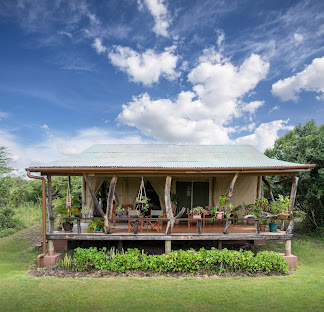Kenya is globally renowned for its exceptional safari destinations, with Ol Pejeta Conservancy and the Masai Mara ecosystem standing out as two of the most iconic. Both offer Big Five experiences, exceptional wildlife viewing, and meaningful conservation efforts—but they differ significantly in landscape, safari style, crowd levels, and conservation models.
This guide breaks down their similarities, differences, and what each has to offer.
📍 Location & Geography
| Feature | Ol Pejeta Conservancy | Masai Mara (Reserve & Conservancies) |
|---|---|---|
| Region | Laikipia (Central Kenya), near Nanyuki | Narok County (Southwest Kenya), bordering Tanzania |
| Distance from Nairobi | ~200 km (3.5–4.5 hrs by road) | ~280–300 km (5–6 hrs by road or 45 min flight) |
| Landscape | Open grasslands, acacia woodland, riverine forests | Vast savannah, rolling plains, seasonal rivers |
| Altitude | 1,800–2,000m | ~1,500–1,700m |
Summary: Ol Pejeta sits in the cooler Laikipia highlands, while the Mara is part of the Great Rift Valley savannahs, with a more open, dramatic landscape.
🛡️ Conservation Model
| Category | Ol Pejeta | Masai Mara & Conservancies |
|---|---|---|
| Management | Private, non-profit conservancy | Mara Reserve: Government-managed; Conservancies: community-private partnerships |
| Land Ownership | Trust-owned (for wildlife and communities) | National Reserve: County Govt; Conservancies: Maasai community lands |
| Reinvestment of Revenue | 100% reinvested into conservation & community | Conservancies reinvest via lease payments; Reserve less consistent |
| Livestock Integration | ✅ Wildlife-livestock coexistence model | ✅ In conservancies (not in reserve) |
Summary: Ol Pejeta is a conservation-first, non-profit model, while the Mara features a mix of state-run and innovative community conservancies like Naboisho and Olare Motorogi.
🐾 Wildlife Experience
| Wildlife Experience | Ol Pejeta | Masai Mara Ecosystem |
|---|---|---|
| Big Five | ✅ Yes | ✅ Yes |
| Northern White Rhinos | ✅ Only place in the world | ❌ Not present |
| Black & Southern White Rhinos | ✅ High populations (best in Kenya) | ❌ Rarely seen (reintroduced in conservancies only) |
| Chimpanzees | ✅ Only in Kenya (Sweetwaters Sanctuary) | ❌ Not present |
| Lions, Elephants, Leopards | ✅ Common, well monitored | ✅ Very common, especially lions |
| Wildebeest Migration | ❌ Not present | ✅ Epic Great Migration (July–Oct) |
| Rare Species | Wild dogs, Grevy’s zebras, pangolins | Cheetahs, servals, elands, topis, caracals |
Summary: Masai Mara offers bigger herds, predators, and migration spectacles. Ol Pejeta focuses on rhino conservation, chimpanzees, and rare species.
🎯 Visitor Experience & Safari Style
| Category | Ol Pejeta | Masai Mara (Reserve & Conservancies) |
|---|---|---|
| Safari Type | Guided or self-drive allowed | Only guided safaris (no self-drive in most areas) |
| Game Viewing Density | Moderate to high; fewer vehicles per sighting | Reserve: Crowded; Conservancies: Low-density, exclusive |
| Night Drives | ✅ Available (with guides) | ❌ Not allowed in Reserve; ✅ In conservancies |
| Walking Safaris | ✅ In predator-free zones | ✅ In conservancies only |
| Horseback Safaris | ✅ Available | ✅ In some conservancies |
| Rhino Encounters | ✅ Face-to-face with Baraka, Najin & Fatu | ❌ No up-close rhino experiences |
| Chimpanzee Encounters | ✅ Sweetwaters Sanctuary | ❌ Not available |
Summary: Ol Pejeta offers diverse, flexible activities, including self-drive and up-close rhino interactions. The Mara Reserve is classic vehicle safari, while conservancies offer intimate, high-end guided experiences.
🏨 Accommodation & Safari Costs
| Feature | Ol Pejeta | Masai Mara Ecosystem |
|---|---|---|
| Budget Options | ✅ Yes (camping, The Stables, Pelican House) | ✅ Yes (in Talek/Sekenani area outside reserve) |
| Mid-Range | ✅ Yes | ✅ Yes (reserve and some conservancies) |
| Luxury Lodges | ✅ Sweetwaters, Kifaru House, Bush Camp | ✅ Many options (e.g., Mahali Mzuri, Angama, Naboisho Camp) |
| Entry Fee (Non-Resident Adult) | $110 (24-hour ticket) | ~$80–$100/day for Reserve + separate conservancy fees |
| Park Access | One daily fee, all activities à la carte | Reserve: Fee per entry; Conservancies: All-inclusive |
Summary: Ol Pejeta is more budget-flexible, while Mara’s luxury conservancies offer all-inclusive packages.
🧑🤝🧑 Community & Conservation Impact
| Impact Area | Ol Pejeta | Masai Mara Ecosystem |
|---|---|---|
| Community Projects | ✅ Clinics, schools, water, women’s programs | ✅ Lease fees to Maasai landowners, cultural programs |
| Anti-Poaching & Ranger Units | ✅ Active dog units, 24/7 patrols | ✅ Strong presence in conservancies |
| Tourism Revenue Sharing | 100% reinvested | Conservancies share ~40–60% with community landowners |
| Livestock Integration | ✅ Boran cattle & rotational grazing | ✅ In some Mara conservancies |
Summary: Both areas support community-centered conservation, though Ol Pejeta has a more direct non-profit structure, while the Mara relies on lease-based conservancy models.
🗓️ Best Time to Visit
| Season | Ol Pejeta | Masai Mara Ecosystem |
|---|---|---|
| Year-round wildlife viewing | ✅ Yes | ✅ Yes |
| Best months | June–October, December–February | July–October (Migration), also good in Jan–Mar |
| Rainy Season | April–May, November (green season) | April–May, November |
Summary: Both are year-round destinations. Visit the Mara during migration season for drama; Ol Pejeta is ideal year-round for rhinos and chimpanzees.
🌟 Unique Selling Points
| Unique to Ol Pejeta | Unique to Masai Mara Ecosystem |
|---|---|
| Last two northern white rhinos in the world | Great Wildebeest Migration (natural wonder of the world) |
| Only chimpanzee sanctuary in Kenya | Highest lion density in Africa |
| Self-drive safaris allowed | World-famous luxury conservancies |
| Rhino-focused conservation & hands-on programs | Iconic savannah scenery & predator action |
| Great for education, families, student groups | Bucket-list destination for big cat photography |
🦏 Final Verdict: Which Safari Destination Is Best for You?
| If You Want… | Choose |
|---|---|
| Budget-friendly and educational safari | ✅ Ol Pejeta |
| Luxury, exclusive, and premium experience | ✅ Masai Mara Conservancies |
| Face-to-face rhino & chimp encounters | ✅ Ol Pejeta |
| To witness the Great Migration | ✅ Masai Mara |
| Rhino and predator conservation immersion | ✅ Ol Pejeta |
| Big cats and dramatic predator-prey action | ✅ Masai Mara |
| Less crowds and more flexibility | ✅ Ol Pejeta (or Mara Conservancies) |
🌍 Can You Combine Both? Yes!
Absolutely. A combined Ol Pejeta + Masai Mara itinerary offers the best of both worlds:
- Days 1–3: Explore Ol Pejeta (rhinos, chimps, conservation)
- Days 4–7: Transfer or fly to Masai Mara (migration, predators, plains)
This makes for an unforgettable, well-rounded safari that balances purpose, wildlife variety, and scenery.
🧡 Final Thoughts from OlPejetaKenya.org
At OlPejetaKenya.org, we’re conservationists passionate about showcasing Ol Pejeta Conservancy as a model of community-first, scalable conservation. While Masai Mara stirs the heart with spectacle, Ol Pejeta nurtures the soul with rhino protection, education, and innovation.
Whether you visit one or both, your journey supports Africa’s future for wildlife and people.
Complete Guide to Ol Pejeta Safari Cottages
Where to Stay, What to Expect, Rates, Amenities, Activities, and How to Book Ol Pejeta…
2-Days / 1-Night Ol Pejeta Safari from Nairobi
Private 4×4 Land Cruiser Tour with Local Expert Driver-Guide Discover Kenya’s most inspiring conservation success…
Ol Pejeta 1-Day Trip from Nairobi (By Road Tour)
Private 4×4 Land Cruiser Safari with Expert Driver-Guide Experience one of Kenya’s most inspiring wildlife…

